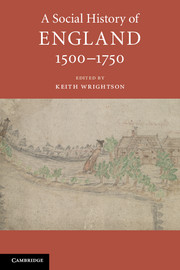Book contents
- Frontmatter
- Contents
- List of Figures
- List of Tables
- List of Contributors
- Acknowledgements
- List of Abbreviations
- Introduction: Framing Early Modern England
- PART I DISCOVERING THE ENGLISH
- PART II CURRENTS OF CHANGE
- 5 Reformations
- 6 Words, Words, Words: Education, Literacy and Print
- 7 Land and People
- 8 Urbanisation
- 9 The People and the Law
- 10 Authority and Protest
- 11 Consumption and Material Culture
- PART III SOCIAL IDENTITIES
- Coda: History, Time and Social Memory
- Further Reading
- Index
7 - Land and People
from PART II - CURRENTS OF CHANGE
Published online by Cambridge University Press: 28 May 2018
- Frontmatter
- Contents
- List of Figures
- List of Tables
- List of Contributors
- Acknowledgements
- List of Abbreviations
- Introduction: Framing Early Modern England
- PART I DISCOVERING THE ENGLISH
- PART II CURRENTS OF CHANGE
- 5 Reformations
- 6 Words, Words, Words: Education, Literacy and Print
- 7 Land and People
- 8 Urbanisation
- 9 The People and the Law
- 10 Authority and Protest
- 11 Consumption and Material Culture
- PART III SOCIAL IDENTITIES
- Coda: History, Time and Social Memory
- Further Reading
- Index
Summary
Robert Loder was a prosperous Berkshire farmer who made over £100 a year selling malted barley, which was shipped down the Thames to London. His account books for 1610–20 record his concerns for the business and profits of farming: issues such as the balance between wheat and barley in his fields and the expense of feeding his live-in farm servants. The Loder household consisted of Robert, his wife, their children and five farm servants – three men and two women. All the adults were actively engaged in farming. While the men worked in the fields and transported grain to market, the female servants malted the barley, milked cows, and picked and marketed fruit from the orchards. Mrs Loder and the female servants baked bread, brewed beer, made cheese and cured bacon, providing all the basic foodstuffs for the household from the products of the farm. Everyone helped in the fields at harvest time. In the same decade of the seventeenth century, Alice Le Strange, the wife a gentleman with an income of over £2,000 a year, began running the home farm on his estate in Hunstanton, Norfolk. Among her employees were the Wix family. Richard Wix, his wife Anne and their son were all occasional agricultural labourers for the Le Stranges, but they also had other means of making a living. Richard's main occupation was as a thatcher, while Anne earned an income from knitting stockings. She also spun wool and made butter and cheese. They had a smallholding; grew a small amount of grain; and kept cows, pigs and poultry. When Richard died in 1628 their moveable goods and livestock were worth £11 12s. A century later, another account keeper, Richard Latham of Scarisbrick, Lancashire, spent his whole adult life living on a 19-acre life-leasehold farm inherited from his father. He rented out some land but also grew wheat, oats and occasionally barley, and kept cows. His wife and daughters spun linen and cotton, both for income and to make household textiles. This farm economy provided them with enough to get by but they were far from self-sufficient. Richard worked for wages and employed others on his farm; the family purchased grain, other foodstuffs such as sugar, and textiles. The Lathams were deeply enmeshed in a local economy of informal loans and exchanges of money, goods and labour.
- Type
- Chapter
- Information
- A Social History of England, 1500–1750 , pp. 152 - 173Publisher: Cambridge University PressPrint publication year: 2017
- 2
- Cited by

